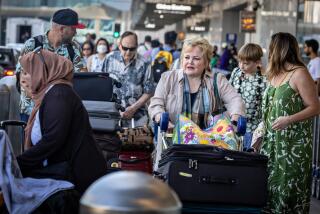A New Vow to Meet Aviation Security Deadline
- Share via
WASHINGTON — Chastened by a blast of congressional criticism, the Transportation Department reversed course Wednesday and said it will comply with an early deadline in the new aviation security bill for screening all checked bags for bombs.
“We will meet the obligations we have under the law,” a senior department official told reporters at a hastily called news briefing.
On Tuesday, Transportation Secretary Norman Y. Mineta said it was unlikely that the Jan. 18 deadline would be met, citing a lack of equipment and personnel. That prompted bipartisan volleys of criticism from Capitol Hill, which continued to reverberate a day later.
The security of checked baggage is widely considered to be a major vulnerability of air travel in the United States. Currently, only a small proportion of bags is scanned for explosives, using a limited number high-tech imaging machines available at major airports.
Congress has allowed the administration to use any combination of techniques to meet the 60-day deadline for screening all checked bags.
The transportation official said that matching bags to passengers who actually board a flight is now a leading option.
That procedure is considered a deterrent to would-be bombers and is already used on international flights. However, airlines have long resisted applying it to domestic flights, arguing that it would cause delays.
“I think you are going to see significantly wider use of baggage matching to get us to this 60-day requirement,” said the official, who could not be named under the rules of the briefing.
Other techniques include X-ray screening, hand searches and the use of bomb-sniffing dogs. A combination of several approaches appears likely.
Congress also set a deadline of Dec. 31, 2002, for more intensive screening of all checked bags with specialized explosives-detection machines.
About 140 high-tech machines capable of detecting bombs are now in place at 50 major airports--not nearly enough to handle luggage for the 700 million passengers who fly each year. The machines cost $1 million apiece plus $750,000 to install.
Moving to repair the damage from the uproar over Mineta’s comments, the Transportation Department reassured lawmakers and the public that it takes seriously its responsibility to revamp aviation security under a totally new federal agency.
“It’s going to be world-class security, coupled with doing it in a user-friendly fashion,” the official said.
Mineta has assigned Deputy Secretary Michael Jackson to oversee creation of the new Transportation Security Administration, which will employ an estimated 28,000 screening personnel, several thousand air marshals and an undetermined number of support staff. Budget figures for the new agency are still unavailable, but its annual costs are likely to run into the billions.
To launch the agency, the department has adopted techniques used in high-stakes, complex undertakings such as military deployments, corporate mergers and large construction projects.
It has hired Kip Hawley, a logistics expert with extensive railroad experience, as a special advisor. Planners have created action teams to deal with specific areas of aviation security, such as technology, passenger screening, background checks for aviation industry employees, and protection of airport facilities. Hundreds of individual items will be integrated into a massive timeline.
A major milestone will come on Nov. 19, 2002, when all security at airport checkpoints must be performed by uniformed federal employees. The official said the changeover will not take place overnight, but will be carried out in stages. The administration has yet to hire a chief executive for the new security agency, which will be under the Transportation Department.
Sen. Ernest F. Hollings (D-S.C.) said he hopes the new security director will be a “hard charger.”
“This is not a typical task that can be subsumed into some bureaucracy someplace and done when they have the time or the resources to do it,” said Sen. Byron L. Dorgan (D-N.D.). “This is an emergency. We have emerging threats. God forbid there should be an explosion on [an] airplane in the coming days or weeks.”
*
Times staff writer Richard Simon contributed to this report.
More to Read
Sign up for Essential California
The most important California stories and recommendations in your inbox every morning.
You may occasionally receive promotional content from the Los Angeles Times.










